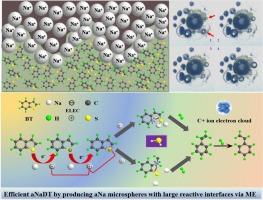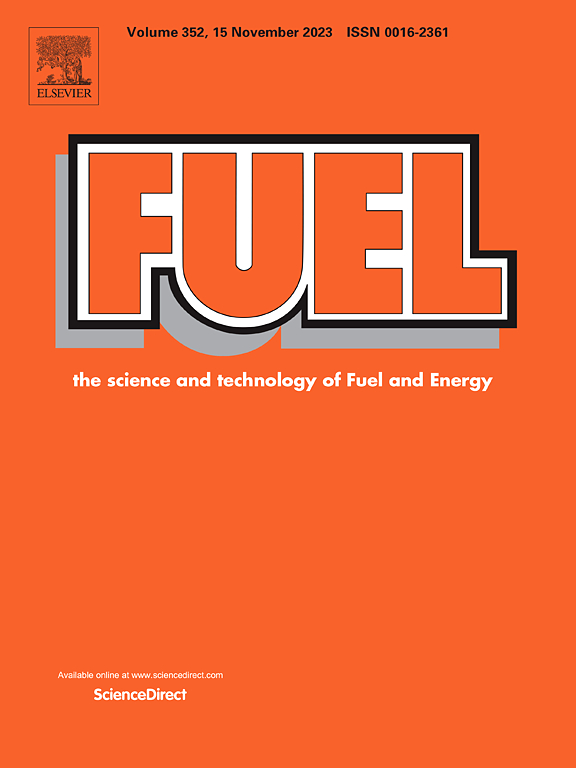Fast electron migration for efficient sodium desulfurization by producing activated sodium metal microspheres with large reaction interfaces
IF 6.7
1区 工程技术
Q2 ENERGY & FUELS
引用次数: 0
Abstract
Achieving a highly efficient desulfurization of heavy feed oils using sodium metal remains challenging owing to its restricted reaction interface. Herein, membrane emulsification technology was adopted to produce monodisperse activated sodium metal (aNa) microspheres with considerably enhanced reaction interfaces for efficient desulfurization of benzothiophene (BT) without requiring a catalyst. By regulating membrane emulsification parameters, the molten sodium into the model oil using a membrane device, optimized aNa microspheres with a particle size of 27.71 μm and a large specific surface area of 2.17 × 105 m2·m−3, which was 50–100 times larger than that of microspheres prepared via mechanical agitation, were obtained. On the basis of the rich reaction interfaces, the efficient sodium desulfurization would proceed via Coulomb-like explosion initiated by aNa to form solvated electrons and cleavage of the C–S bond at one end to generate C+, which trigger the final cleavage of the C–S bond in BT under the continued attack of the fast C+ electron cloud, together with the generation of styrene and sodium sulfide. With the assistance of hydrogenation, fast and efficient benzothiophene desulfurization was achieved with a desulfurization efficiency of > 90 % within 15 min under the optimized reaction conditions, i.e., reaction temperature, pressure, and Na/S ratio. This study provides a fast and efficient sulfur removal technology to replace conventional catalytic hydrodesulfurization.

通过生产具有大反应界面的活性金属钠微球实现快速电子迁移,从而实现高效钠脱硫
由于金属钠的反应界面受到限制,因此使用金属钠实现重质原料油的高效脱硫仍具有挑战性。本文采用膜乳化技术生产单分散活性金属钠(aNa)微球,该微球的反应界面显著增强,无需催化剂即可实现苯并噻吩(BT)的高效脱硫。通过调节膜乳化参数,利用膜装置将熔融钠注入模型油中,获得了粒径为 27.71 μm、比表面积为 2.17 × 105 m2-m-3 的优化 aNa 微球,其比表面积是机械搅拌制备的微球的 50-100 倍。在丰富的反应界面基础上,高效钠脱硫将通过 aNa 引发的库仑样爆炸形成溶解电子,并在一端裂解 C-S 键生成 C+,在快速 C+电子云的持续攻击下引发 BT 中 C-S 键的最终裂解,同时生成苯乙烯和硫化钠。在氢化的辅助下,苯并噻吩实现了快速高效的脱硫,在优化的反应条件(即反应温度、压力和 Na/S 比)下,15 分钟内脱硫效率达 90%。这项研究为取代传统的催化加氢脱硫提供了一种快速高效的脱硫技术。
本文章由计算机程序翻译,如有差异,请以英文原文为准。
求助全文
约1分钟内获得全文
求助全文
来源期刊

Fuel
工程技术-工程:化工
CiteScore
12.80
自引率
20.30%
发文量
3506
审稿时长
64 days
期刊介绍:
The exploration of energy sources remains a critical matter of study. For the past nine decades, fuel has consistently held the forefront in primary research efforts within the field of energy science. This area of investigation encompasses a wide range of subjects, with a particular emphasis on emerging concerns like environmental factors and pollution.
 求助内容:
求助内容: 应助结果提醒方式:
应助结果提醒方式:


